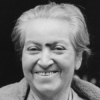Gabriela Mistral

Gabriela Mistral
Gabriela Mistralwas the pseudonym of Lucila Godoy y Alcayaga, a Chilean poet-diplomat, educator and humanist. She was the first Latin American author to receive the Nobel Prize in Literature, which she did in 1945 "for her lyric poetry which, inspired by powerful emotions, has made her name a symbol of the idealistic aspirations of the entire Latin American world". Some central themes in her poems are nature, betrayal, love, a mother's love, sorrow and recovery, travel, and Latin American identity...
NationalityChilean
ProfessionPoet
Date of Birth7 April 1889
CityVicuna, Chile
CountryChile
We are guilty of many errors and many faults but our worst crime is abandoning the children, neglecting the fountain of life. Many of the things we need can wait. The child cannot. Right now is the time his bones are being formed, his blood is being made, and his senses are being developed. To him we cannot answer 'Tomorrow.' His name is 'Today.'
You shall create beauty not to excite the senses but to give sustenance to the soul.
Many things can wait. Children cannot. Today their bones are being formed, their blood is being made, their senses are being developed. To them we cannot say "tomorrow." Their name is today.
Love beauty it is the shadow of God on the universe
We are guilty of many errors and many faults, but our worst crime is abandoning the children, neglecting the fountain of life. Many of the things we need can wait. The child cannot. Right now is the time his bones are being formed, his blood is being made, and his senses are being developed. To him we cannot answer ‘Tomorrow,’ his name is today.
Speech is our second possession, after the soul-and perhaps we have no other possession in this world.
Let the earth look at me, and bless me, for now I am fecund and sacred, like the palms and the furrows.
Writing tends to cheer me; it always soothes my spirit and blesses me with the gift of an innocent, tender, childlike day. It is the sensation of having spent a few hours in my homeland, with my customs, free whims, my total freedom.
A crippled child Said, "How shall I dance?" Let your heart dance We said. Then the invalid said: "How shall I sing?" Let your heart sing We said Then spoke the poor dead thistle, "But I, how shall I dance?" Let your heart fly to the wind We said. Then God spoke from above "How shall I descend from the blue?" Come dance for us here in the light We said. All the valley is dancing Together under the sun, And the heart of him who joins us not Is turned to dust, to dust.
All night I have suffered; all night my flesh has trembled to bring forth its gift. The sweat of death is on my forehead; but it is not death, it is life!
What the soul is to the body, so is the artist to his people,
Love that stammers, that stutters, is apt to be the love that loves best.
In the secret of night, my prayer climbs like the liana, My prayer is, and I am not. It grows, and I perish. I have only my hard breath, my reason and my madness. I cling to the vine of my prayer. I tend it at the root of the stalk of night.
The poet is an untier of knots, and love without words is a knot, and it drowns.